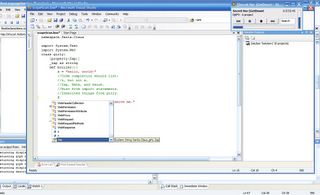That's the name of the class that does most of the heavy lifting for the newer, more robust implementation of member select, complete word, and hopefully the other future actions that are part of a language service's parsing. I've refactored a lot of code; the end result is a faster-better-cleaner implementation of parsing services so far.
Still on my todo list:
- Cache the AST tree for the 'autos' and 'locals' function of the debugger.
- Project support. A biggie, obviously.
- Debugger support. Another biggie.
- Integrate Boo's keywords and macros into code completion. I'll be honest: macros and builtins seem kind of difficult to do dynamically without hard-coding them all. Macros like "print" are really expanded to PrintMacro - how should I handle this?



